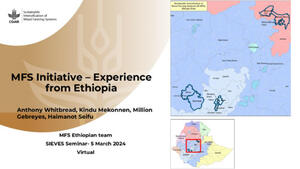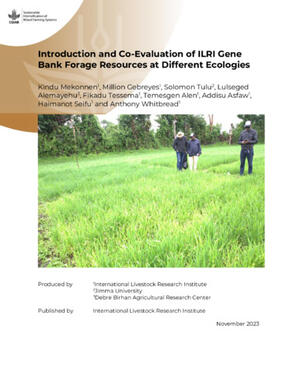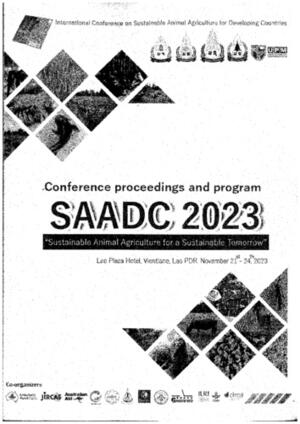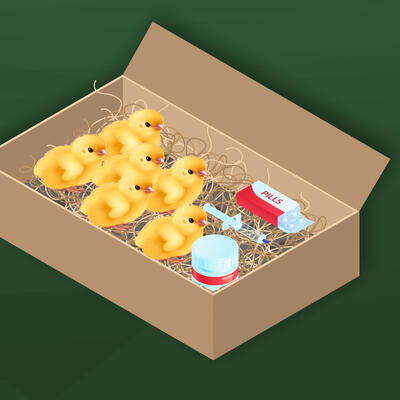
Ripples of change and winning people over with engagement: Lessons from Africa RISING
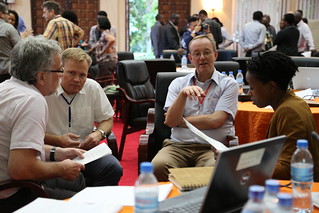 Working with the same group of people to support their events and processes clearly presents many opportunities. One of them is that through regular engagement it becomes possible to shift the attitude and ideas of the group and the course of their events and processes.
Working with the same group of people to support their events and processes clearly presents many opportunities. One of them is that through regular engagement it becomes possible to shift the attitude and ideas of the group and the course of their events and processes.
The Communications and Knowledge Management (CKM) team of the International Livestock Research Institute (ILRI) has benefited from three years of engagement with the Africa RISING program teams in East and Southern Africa, the Ethiopian highlands and West Africa. The CKM team has contributed to a series of review and planning meetings and other events by providing design, logistical organization, facilitation and documentation support. This role started with the project launch meetings in early 2012 when the Africa RISING program leaders and the funding partner (the United States Agency for International Development, USAID) recognized the importance of communication and process facilitation in their activities.
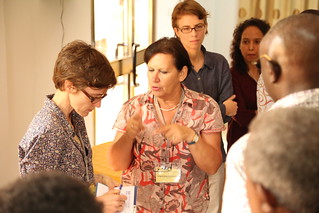 Since then the CKM team has been involved in every project review and planning meeting and various program meetings, giving the team and all involved many opportunities to learn, share and help the group to do their best thinking in terms of achieving the objectives in the best possible way.
Since then the CKM team has been involved in every project review and planning meeting and various program meetings, giving the team and all involved many opportunities to learn, share and help the group to do their best thinking in terms of achieving the objectives in the best possible way.
Every step and every event of this engagement journey has been a stepping stone for the next event, progressively transforming the mindset of the organizing team. Bringing in (good) facilitation usually leads to changing the attitude and behavior of participants from potential resistance to cooperation; from possible conflict to increased mutual understanding; and from discussions to result-oriented action. For organizers, involving good facilitators may also imply that they shift from thinking of an event as a PowerPoint recital into organizing more engaging events where group conversations, interactions and co-creation become central.
This is the journey that Africa RISING project teams went through with every review and planning meeting. As West Africa chief scientist Asamoah Larbi summed up at the end of the last review and planning meeting for West Africa, “This was very good”, and that meeting was probably the most experimental review and planning meeting in terms of moving away from the typical PowerPoint recital mentioned above.
What are the results and lessons of this event support?
As a result we were able to generate extensive outputs
- Most of the documents and group discussions have been documented on the Africa RISING wiki (work space);
- 162 presentations have been published on the Africa RISING Slideshare, many of which directly collected from these events;
- Nearly all events have had their dedicated collection of pictures published on the Africa RISING FlickR;
- Interviews, stories and other insights have been captured on the Africa RISING website;
- All final outputs of public consumption generated by these events have been captured on the program repository collection on CGSpace.
These results complement the efforts that Africa RISING communication officers are putting into collecting success stories, challenges and research results as published on the website, harvesting 290 publications (working papers, publications, briefs, etc.) on CGSpace, and documenting activities through video and photo films.
What are some of the lessons?
At the end of every event, to review what happened or what may happen in the next event, the CKM team and organizers run an ‘after action review’ (AAR) to better understand the gaps, learn and plan for improved next meetings. Here are some of these reflections.
- It has become easier, over time, to recognize whether the review and planning meetings, according to their organizers, actually aim at sharing information, collecting feedback or moving towards taking collective decisions. It has also become easier to influence the course of the events towards the more collective end of that spectrum – recognizing that co-creation is key to long-term collaboration in a program of this kind.
- As has been the case in many different programs in the experience of ILRI, events have been a great way to introduce a wider palette of communication support (such as social reporting, harvesting and curating outputs etc.) to the benefit of the project teams;
- Being involved in the program for many years also means the facilitators have vastly increased their understanding of what it is trying to achieve, to an extent that no other facilitator could easily match, and scientists seem to appreciate this;
- The facilitation team has been able to progressively propose more innovative, engaging and collaborative methods to help the groups engage and learn better. These different ways have helped challenge the participants, kept them motivated and helped them bond with each other;
- Participants generally appreciated the value of facilitation and event organizers have involved CKM facilitators at increasingly early stages of the event design, when key decisions are made;
- As a result, efforts put into preparing group work appropriately (for review and planning meetings when teams have to generate comprehensive plans for the next year) have borne fruit and led to more coordination by the teams ahead of the event and much more time made available for integrating activities and thinking about typically abandoned cross-cutting issues such as gender, capacity development and communication;
- The program learning events have been useful opportunities to showcase what an interactive event looks like, and to generate ideas for the more business-as-usual review and planning meetings;
- At the same time, the focus on things other than strictly ‘science’ has created a thirst, among Africa RISING scientists, for a science symposium, which is planned for the last quarter of 2015;
- Although this is not part of facilitation support, ensuring strong logistical coordination among organizers and with the facilitation team has ensured participants are not distracted by challenging logistical circumstances;
- The facilitation team should focus on finding ways to draw out shy participants and encourage a space where genuinely all voices can be heard.
Being involved from the beginning until now has helped the CKM team create an interactive and engaging space for participants to do their best thinking and generate better results. One can safely assume that through this progressive engagement supported by CKM, event participants are now more focused and engaged; this work has created stronger linkages across the program teams working in different regions; internal communication, sharing ideas and learning from each other has improved and led to better documentation and a more complete harvest of outputs.
Africa RISING has another year and a half to go and this means more opportunities to strengthen these events. This is not a luxury given that the project coordination teams themselves have realized the need for more coordination and inter-linkages across regions. Facilitated collaboration has never been more popular.
If you would like to get CKM team support for your events (find out all the options that this covers), please contact:
Ewen Le Borgne, Team leader, knowledge, engagement and collaboration, ILRI, Addis Ababa.
Tsehay Gashaw, Knowledge sharing and web communications officer, ILRI, Addis Ababa.
Muthoni Njiru, Knowledge sharing and engagement officer, ILRI, Nairobi.
By Tsehay Gashaw and Ewen Le Borgne









